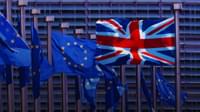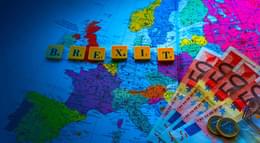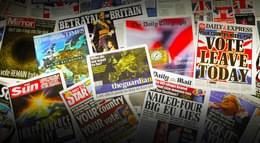
European Integrationists and Social Justice Warriors
Bruce Newsome assesses Norman Johnsen's case for EU member states returning to a close alliance of independent nation-states, while Britain gives up its neo-Popperian ideals of "globalization", "political correctness", and "multiculturalism" for its traditional "values".
A rash of publications on Brexit have been released in the month of June 2018 – the second anniversary of the referendum. Norman Johnsen's "Brexit: The Quest for Freedom" is an unusually short and direct offering, which is most valuable in pointing to the commonality between European integration and the beastly politics variously known as "identity politics" or "social justice."
Johnsen's book has the problems and appeals of a subjective comment on Brexit. It is personal, short on evidence, inadequately sourced, and under-specified, but it is also authentic: the author's rage and indignation are palpable throughout. For people who still turn blind eyes and deaf ears to Brexiteers, who lament inadequate research into the disaffected majority, who want to understand the other side, or who prefer to tackle a collective through an emblem, this book could be their exemplar.
The book opens with a criticism of David Cameron's "arrogance" for expecting voters to "follow his advice" and bow to "Project Fear". The author identifies with the voters who rejected the "grubby thieving politicians, liberal intellectual cranks, and a corrupt EU bureaucracy."
Such immoderation will not endear the book to an ambivalent browser, but the author writes quickly and gets to some good points, articulated well. For instance, he points out that Britain would be inevitably "marginalised" by a European institution that either puts regions ahead of nation-states or favours its founding nation-states (the EU does both). This is a structural point that is not typical of popular writers, who tend to focus on cultures. Readers who are looking for the authentic Brexiteer culture are likely to skip over such structural points and just collect an impression of rage, then go away telling their friends that Brexiteers are just angry. In this book you'll get both cultural anger and structural reasons. It's up to you to admit both.
The author's intellectual lenses are historical and philosophical. He has a strong sense of the historical, making analogies from the EU to ancient empires, from foreign aid to Danegeld, from the EU's "centralized despotism" to early-modern hegemons. He makes contrasts between ancient Greek affinity and modern European fakery, between Britain's leadership in the Commonwealth and Britain's subservience in Europe, between Britain's settled past and its destabilization by urbanization, centralization, and displacement. These links are interesting, although selective.
The author is best sourced on contemporary British politics. Along the way, he has taken in some political philosophy, although his sources tend to be indirect – through historians and political commentators. The author quotes rarely, preferring his own voice; his quotes jump from Pericles through Winston Churchill to Peter Hitchens of the Daily Mail.
Karl Popper is important enough for the author to allocate a whole chapter in a book of only eight short chapters. George Orwell gets another. These chapters are not explicitly justified but they are most interesting and useful.
Johnsen exposes Karl Popper as a superficial historian whose political philosophy was little more than a motivated bias – Popper's hope for an "open society" became a prescription that became a theory. Ironically, Popper was a historical determinist while claiming to offer an alternative to Marxist historical determinism; he also prescribed social engineering while claiming to offer an alternative to Marxist interventionism.
Karl Popper became the hero for the new "liberal intelligentsia" that wanted to change society but not identify with Marxism. Their sniffy intellectual pretensions are based on superficial readings of superficial writers. Marx and Popper wrote childishly fallacious and unfounded polemics, but they are treated like gospel by people who either haven't read them or don't know how to argue. The most relevant example is George Soros, who established the "Open Society Foundation" to promote European integration.
The European integrationist's reductionisms are Popper's reductionisms. Are you tired of your concerns about border control or uncontrolled immigration or social cohesion being miscast as racism? You can partly blame Popper's short argument that all attachment to traditional nation-states is bigoted. Popper's argument is circular; he defined a nation-state as a nation, then observed that no nation-state was nationally pure, then concluded that nation-states don't exist and that people who think otherwise must be bigots. Thence, he argued, you might as well integrate to an open society, but slowly, by a subtle social engineering that gradually excludes nationalisms without provoking too much resistance.
You're probably already realizing the commonality between Popper and social justice warriors. The social justice agenda also starts with Karl Marx. Karl Popper offered an imaginary alternative that is essentially the same: societal problems are structural, from class boundaries to national boundaries that advantage some people from birth; social justice warriors are more focused on gender and race as the root causes. In either case, they argue that those advantages need to be corrected by socio-political intervention. Such intervention is inherently authoritarian, so you need a super state. Nation-states are bad anyway, so nation-states should surrender sovereignty to this super state and destroy all nationalisms on the way, so that everybody can pretend that the super state is better than a nation-state.
"Brexit" The Quest for Freedom" contrasts Karl Popper with George Orwell. This is useful because Orwell started life as a privileged, nationalist Georgian, then rebelled by celebrating an under-defined "working class," became dissonant between Marxism's theoretical protection of the working class and its practical hypocrisies, and ended up both criticizing the intelligentsia and celebrating Englishness (yes, he was Anglocentric, but then he was also English).
Johnsen's chapter on Orwell begins during the Second World War, when Orwell retrospectively criticized the post-Georgian left-wing intelligentsia for a mania for all things continental, in denial of their Britishness. Orwell argued that patriotism held societies together and protected them from false gods, while left-wing fashions were based on wishful-thinking and over-compensation. Today's privileged, white, hysterical social justice warriors should take note.
Johnsen's book concludes that European integration should return to where it started – as "a close alliance of independent nation-states, working together for purposes of defence and economic prosperity," subject to World Trade Organization rules, while Britain should give up the neo-Popperian ideals of "globalization", "political correctness", and "multiculturalism" for its traditional "values".
Along the way, the author had made a good case for restoring "a sound education" in British history. I would restore a sound education in empiricism too.
Book Review: Brexit: The Quest for Freedom, authored by Norman Johnsen, published by Arena Books, June 2018. 92 pages. ISBN: 9781911593232. UK £12.99.









